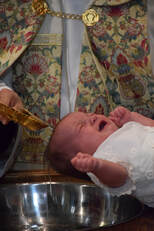
Baptism
For Catholics, the Sacrament of Baptism is the first step in a lifelong journey of commitment and discipleship. Whether we are baptized as infants or adults, Baptism is the Church's way of celebrating and enacting the embrace of God.
The Sacrament of Baptism is celebrated on the first Sunday of every other month. Parents and godparents are to attend the Baptism class offered on the Friday before the first Sunday of that month. The choice of godparents should be in accord with canon (church) law which all practicing Catholics are responsible to uphold.
Eucharist
Catholics recognize the Eucharist, or Holy Communion, is both a sacrifice and a meal. We believe in the real presence of Jesus, who died for our sins. The real presence means that we believe Jesus is completely and entirely present in the consecrated bread and wine. The Eucharist is Jesus' Body, Blood, Soul, and Divinity. As we receive Christ's Sacred Body and Precious Blood, we also are nourished spiritually and brought closer to God. Since it is one of the greatest gifts that God has given to us, it must be approached with the greatest sense of reverence, attention, and respect. Only Catholics who have received their First Holy Communion and are in a state of grace (no knowledge of having any unconfessed mortal sins) are able to present themselves to receive Holy Communion. We heed the words of St. Paul in 1 Corinthians 11: 27-30.
Reconciliation
Reconciliation (also known as Penance or Confession) has three elements: conversion, confession and celebration. In it, contrite penitents encounter the Father's unconditional forgiveness. This sacrament restores our relationship with God and neighbor, reminding us that we are also called to forgive one another.
Confirmation
Confirmation is a Catholic Sacrament of mature Christian commitment and a deepening of baptismal gifts. It is one of the three Sacraments of Initiation for Catholics. It is when we receive the fullness of the Holy Spirit and recall the gifts of the Holy Spirit.
Marriage
For Catholics, the Sacrament of Marriage, or Holy Matrimony, is a public sign between a man and a woman who offers oneself completely to the other. The Sacrament draws upon the covenantal relationship that exists between Jesus and His Bride, the Church. It is also a public statement about God: the loving union of husband and wife speaks of family values and also God's values.
Holy Orders
In the Sacrament of Holy Orders, or Ordination, the man being ordained vows to lead other Catholics by bringing them the sacraments (especially the Eucharist), by proclaiming the Gospel, and by providing other means to holiness.
Anointing of the Sick
The Catholic Sacrament of Anointing of the Sick, formerly known as Last Rites or Extreme Unction, is a ritual of healing appropriate not only for physical but also for mental and spiritual sickness.
For Catholics, the Sacrament of Baptism is the first step in a lifelong journey of commitment and discipleship. Whether we are baptized as infants or adults, Baptism is the Church's way of celebrating and enacting the embrace of God.
The Sacrament of Baptism is celebrated on the first Sunday of every other month. Parents and godparents are to attend the Baptism class offered on the Friday before the first Sunday of that month. The choice of godparents should be in accord with canon (church) law which all practicing Catholics are responsible to uphold.
Eucharist
Catholics recognize the Eucharist, or Holy Communion, is both a sacrifice and a meal. We believe in the real presence of Jesus, who died for our sins. The real presence means that we believe Jesus is completely and entirely present in the consecrated bread and wine. The Eucharist is Jesus' Body, Blood, Soul, and Divinity. As we receive Christ's Sacred Body and Precious Blood, we also are nourished spiritually and brought closer to God. Since it is one of the greatest gifts that God has given to us, it must be approached with the greatest sense of reverence, attention, and respect. Only Catholics who have received their First Holy Communion and are in a state of grace (no knowledge of having any unconfessed mortal sins) are able to present themselves to receive Holy Communion. We heed the words of St. Paul in 1 Corinthians 11: 27-30.
Reconciliation
Reconciliation (also known as Penance or Confession) has three elements: conversion, confession and celebration. In it, contrite penitents encounter the Father's unconditional forgiveness. This sacrament restores our relationship with God and neighbor, reminding us that we are also called to forgive one another.
Confirmation
Confirmation is a Catholic Sacrament of mature Christian commitment and a deepening of baptismal gifts. It is one of the three Sacraments of Initiation for Catholics. It is when we receive the fullness of the Holy Spirit and recall the gifts of the Holy Spirit.
Marriage
For Catholics, the Sacrament of Marriage, or Holy Matrimony, is a public sign between a man and a woman who offers oneself completely to the other. The Sacrament draws upon the covenantal relationship that exists between Jesus and His Bride, the Church. It is also a public statement about God: the loving union of husband and wife speaks of family values and also God's values.
Holy Orders
In the Sacrament of Holy Orders, or Ordination, the man being ordained vows to lead other Catholics by bringing them the sacraments (especially the Eucharist), by proclaiming the Gospel, and by providing other means to holiness.
Anointing of the Sick
The Catholic Sacrament of Anointing of the Sick, formerly known as Last Rites or Extreme Unction, is a ritual of healing appropriate not only for physical but also for mental and spiritual sickness.
